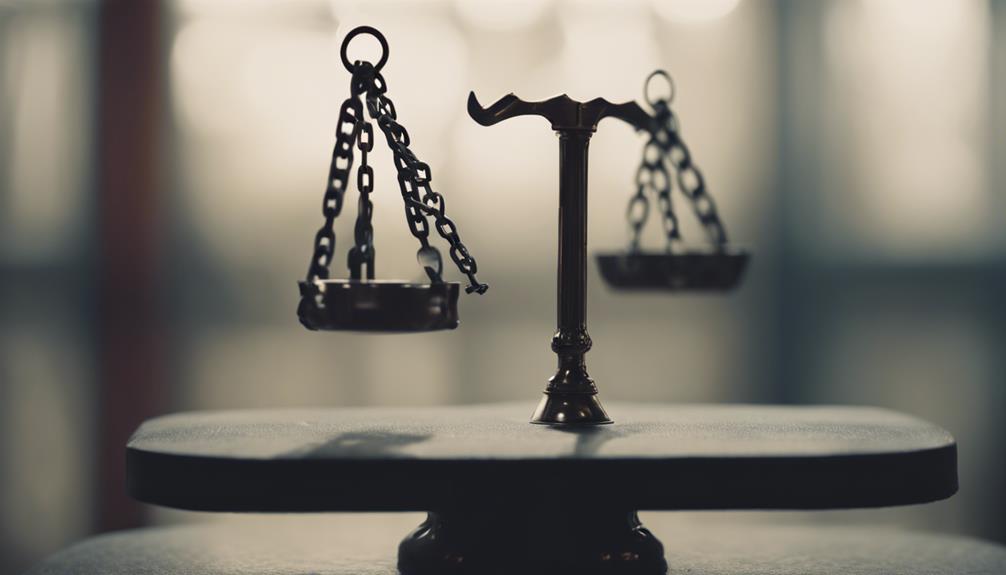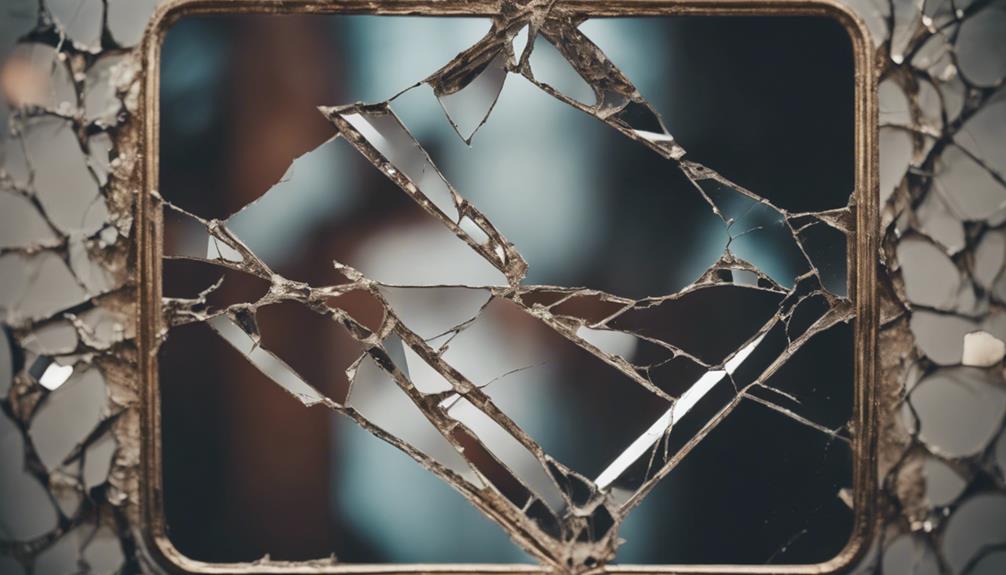Narcissistic abuse is not specifically considered a crime in many legal systems, making it difficult for victims to seek justice. The lack of clear legal measures makes it hard to hold abusers accountable and find relief for the victims. Efforts are being made to push for legal reforms to protect victims. The impact of this abuse can result in mental, physical, and financial harm, often leading to conditions like C-PTSD. Prosecuting such abuse is challenging as it involves proving manipulation and gathering solid evidence. Advocacy to criminalize this type of abuse aims to break the cycle of harm and ensure justice for victims. Understanding legal frameworks, identifying gaps, and utilizing support services are crucial in effectively addressing this issue. More information is available.
Key Takeaways
- Narcissistic abuse is not yet a specific crime in many legal systems.
- Legal recognition is crucial to prosecute narcissistic abuse effectively.
- Existing laws may indirectly address aspects of narcissistic abuse.
- Advocacy is ongoing to criminalize narcissistic abuse for victim protection.
- Victims can seek legal recourse through related laws and support services.
Legal Recognition of Narcissistic Abuse
Legal recognition of narcissistic abuse remains a vital issue in many legal systems worldwide. Victims of narcissistic abuse often encounter hurdles when trying to seek justice within the legal system. The lack of specific laws addressing this form of abuse can make it challenging for individuals to receive the necessary legal protection and support.
Without clear recognition in legal frameworks, victims may struggle to hold perpetrators accountable for their actions. To address these shortcomings, advocacy efforts are essential to advocate for reforms that acknowledge and incorporate the complexities of narcissistic abuse into the legal system. By pushing for changes that specifically address narcissistic abuse, we can better support those who've experienced such trauma and work towards a more just and inclusive legal response to this form of abuse.
It's vital to highlight the importance of legal recognition in ensuring the safety and well-being of individuals affected by narcissistic abuse.
Impact on Victims and Society

Recognizing the widespread impact of narcissistic abuse on individuals and society is essential in addressing the profound harm it inflicts. Victims of narcissistic abuse endure a range of abusive behaviors that can have devastating effects on their mental, physical, and financial well-being.
Mental health professionals emphasize the severe trauma experienced by victims, often leading to conditions like Complex Post-Traumatic Stress Disorder (C-PTSD). The consequences can be so severe that some victims contemplate or commit suicide, underscoring the urgent need for validation and protection.
Strengthening legal measures is vital in safeguarding victims and preventing further harm in society. Regardless of gender, race, or culture, victims of narcissistic abuse deserve justice, validation, and robust safeguards against this pervasive form of mistreatment.
Challenges in Prosecuting Narcissistic Abuse

Tackling the complexities of prosecuting cases involving narcissistic abuse presents significant hurdles due to the manipulative tactics employed by abusers and the elusive nature of tangible evidence. As we navigate these challenges, several key factors come into play:
- Utilizing accurate legal language is essential in defining the specific crimes committed in cases of narcissistic abuse.
- Gathering concrete evidence, such as detailed journals, text messages, emails, and witness statements, plays a critical role in supporting legal claims and building a strong case.
- Implementing effective strategies and providing adequate support to victims are vital components in overcoming obstacles and achieving successful prosecution in cases of narcissistic abuse.
Advocacy for Criminalizing Narcissistic Abuse

Advocates emphasize the importance of criminalizing narcissistic abuse to guarantee accountability for perpetrators and safeguard victims.
By establishing specific legal consequences for such behavior, we can interrupt the cycle of abuse and prevent further harm.
Criminalization offers a clear path to justice and support for those affected by narcissistic abuse.
Legal Implications of Abuse
We believe that criminalizing narcissistic abuse is vital to guarantee justice and protection for survivors. Recognizing narcissistic abuse as a criminal offense is essential for holding perpetrators accountable and preventing further harm.
Legal implications surrounding this issue highlight the severity and impact of narcissistic abuse on victims, emphasizing the need for specific legal measures to address the complexities within the justice system.
By criminalizing narcissistic abuse, we aim to make sure that survivors receive the justice they deserve and that perpetrators are held accountable for their actions.
- Holding perpetrators accountable for their actions
- Providing justice and protection for survivors
- Preventing further harm through legal measures
Impact on Victims
Recognizing the profound impact of narcissistic abuse on victims, criminalizing this form of abuse is essential in ensuring justice and protection for survivors.
Victims often experience severe trauma, sometimes leading to conditions like Complex Post-Traumatic Stress Disorder (C-PTSD). This impact knows no boundaries, affecting individuals globally regardless of gender, race, or culture.
Advocates stress the urgent need for legal recognition and protection for victims of narcissistic abuse. By pushing for the criminalization of this behavior, we can hold perpetrators accountable and break the cycle of abuse.
Global efforts are underway to raise awareness, prosecute abusers, and secure justice and protection for those affected by this insidious form of mistreatment.
Existing Legal Frameworks and Gaps

Existing legal frameworks often lack specific provisions for addressing narcissistic abuse as a distinct criminal offense. This creates challenges in prosecuting perpetrators solely based on psychological manipulation tactics. The gaps in the system hinder efforts to hold abusers accountable and provide justice to victims.
Updating and strengthening legal frameworks is essential to effectively combat the complexities of narcissistic abuse and guarantee adequate protection and support for survivors.
Legal Protections Overview
Within the current legal landscape, addressing narcissistic abuse poses significant challenges due to the lack of specific provisions that cater to its intricate nature.
- Victims of narcissistic abuse often struggle to find adequate legal protections due to the covert tactics employed by abusers.
- Legal frameworks may not fully recognize the nuances of narcissistic abuse, creating gaps in protection for victims.
- Prosecuting narcissistic abusers can be challenging due to these legal gaps, leaving victims without proper recourse.
Improving legal measures to combat narcissistic abuse is essential to guarantee justice and protection for victims. By closing these gaps in the legal system, we can work towards holding perpetrators of narcissistic abuse accountable for their actions.
Victim Support Services
Victim support services play an essential role in providing emotional, legal, and practical assistance to individuals impacted by narcissistic abuse. These services offer counseling, safety planning, court accompaniment, and referrals to other resources for victims.
While existing legal frameworks may provide some support, there are significant gaps in addressing the complexities of narcissistic abuse. Gaps in the legal system can hinder effective victim support, underscoring the need for tailored services and interventions.
Support services are vital in helping survivors navigate the legal system, access resources, and rebuild their lives after experiencing narcissistic abuse. By offering emotional assistance and safety planning, victim support services aim to empower individuals to seek help, protect themselves, and heal from the trauma of narcissistic abuse.
Potential Solutions and Way Forward

Implementing immediate and permanent No Contact orders can be a vital step in protecting victims of narcissistic abuse from further harm and manipulation. It's essential to establish clear boundaries to prevent abusers from continuing their toxic behavior.
Additionally, holding narcissistic abusers criminally accountable with jail time can serve as a deterrent for future abuse, sending a strong message that such behavior won't be tolerated in society. Charging abusers in cases of victim death or suicide is necessary to guarantee justice and accountability for the harm caused, providing closure for the victims and their families.
Preventing abusers from misusing the legal system can help victims seek justice without interference, allowing them to navigate legal proceedings safely. Ensuring restitution for victims who lose employment due to abuse can address the financial impact of narcissistic abuse, providing some form of compensation for the losses endured.
Frequently Asked Questions
How Do You Prove Narcissistic Abuse in Court?
To prove narcissistic abuse in court, we must meticulously document incidents with dates, times, and descriptions. Saving evidence like text messages, emails, and voicemails that reveal manipulation is essential.
Witness statements from those who observed the abuse firsthand can bolster our case. By compiling a strong collection of evidence, we increase our chances of proving narcissistic abuse in a legal setting.
Concrete evidence is fundamental for successful legal claims of narcissistic abuse.
What Qualifies as Narcissistic Abuse?
When discussing what qualifies as narcissistic abuse, it's important to recognize the patterns of emotional manipulation, gaslighting, and control tactics used to dominate and subjugate victims. Demeaning, belittling, and isolating behaviors aimed at maintaining power characterize this abuse. Victims often experience diminished self-worth and emotional distress.
Understanding these signs is essential in addressing this harmful behavior effectively. Identifying and acknowledging these abusive tactics is the first step towards healing and recovery.
Are There Laws Against Narcissistic Abuse?
Currently, laws specifically addressing narcissistic abuse as a distinct criminal offense don't exist. Legal systems typically rely on laws related to domestic violence, harassment, or emotional abuse to address such cases.
Proving the covert and manipulative nature of narcissistic abuse within the legal framework is a challenge. Advocacy efforts are ongoing to have narcissistic abuse recognized as a separate crime with appropriate legal consequences, necessitating legal reforms for better protection and justice for victims.
Can I Sue a Narcissist for Emotional Abuse?
Yes, we can sue a narcissist for emotional abuse. It involves initiating a civil lawsuit and presenting evidence to support the claim.
Gathering documentation, such as emails or texts, showing abusive behavior is vital. Seeking legal advice from professionals specializing in abuse cases will help navigate the process effectively.
Conclusion
Ultimately, while narcissistic abuse may not be explicitly recognized as a crime in many legal systems, it can have severe impacts on victims and society. The challenges in prosecuting such abuse are significant, but advocacy for criminalizing it's gaining traction.
Existing legal frameworks may have gaps in addressing this issue, but there are potential solutions to ponder moving forward. It's vital to raise awareness and push for legal reforms to protect individuals from this harmful behavior.










